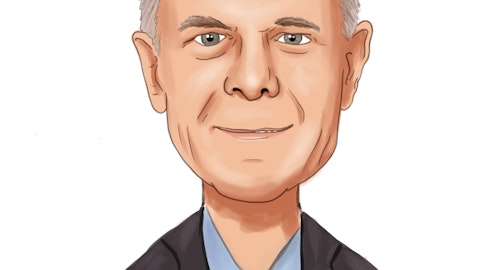Lou Haddad: Sure. Camille, right now, we’ve got a number of sources of equity and we’re staring at a lot of opportunities to pick up some really good properties on an off market basis. And like I mentioned before, using the company’s stock at a premium price. So we’re excited to get that done. Matt’s got a lot of arrows in the quiver and, of course, we’ve now added the private placement market, plus we have the ability to expand our credit line through an accordion feature as well as liquidity we have on balance sheet. And so we’re feeling that with acquisitions we will stay in that range that Matt has mentioned. He’s going to kick me under the table if I say anything other than that. But we also — lastly, I want to make sure everybody understands, we sold over $300 million of noncore assets in the last 12 or 14 months.
We still have noncore assets that we can use if necessary for a ready source of capital. Plus I mentioned the T. Rowe Price exit is a potentiality. So there’s a number of different ways we can go, but our expectation is that we’re not going to get out of that range that Matt had mentioned. Also important to note is that, it is in our guidance that the Interlock will transact irrespective of who buys it, that $80 million some will not be outstanding the end of the year is our forecast.
Camille Bonnel: Thank you. Appreciate the color there. And many of my questions have been answered already. So just one follow-up as I wanted to make sure I caught your earlier comments on the same store outlook. And you’re expecting NOI to increase next year. So are you saying your expectations for occupancy will remain positive or improve in 2023 even factoring for any unknown move outs in your office or retail portfolio?
Lou Haddad: Sure. Well, I understand improvement is relative. We’re starting from a base of 98% occupied. So there’s not a lot of extra space to lease. As Shawn mentioned, we’re essentially trying to shoehorn one more tenant into Town Center here in our office space, a global organization as well. Our expectation is that, we’re going to stay at or near or slightly above that 98% level in office and retail. We are projecting that multifamily will moderate again back to historical norms of being in the mid-90s with single digit increases as opposed to what we’ve all seen in the last couple of years.
Camille Bonnel: Okay. Thank you.
Operator: Your next question comes from Chris Sakai of Singular Research. Please go ahead.
Chris Sakai: Hi, good morning. Can you talk about the main drivers for the normalized funds from operations growth and guidance?
Lou Haddad: Yes. I think if you look at the guidance package, the main drivers are really twofold. On page three of the guidance, the guidance deck. Portfolio NOI is the biggest increase and that, again, is basically two factors: one being same-store sales being up across the board in each of our sectors as well as a full year of stabilized — newly stabilized properties which obviously, on a year-over-year basis, gives a pretty significant boost. We’re also forecasting a pretty substantial increase in construction income based on that $600 million backlog that we mentioned. Our guys — I’ll take a second to say our guys are doing a phenomenal job. You can imagine, we basically doubled our historical backlog at a lot of large complex projects, and they’re running full out and doing a great job for us.
And lastly, the moderating effect of both of those on the negative, if you will, side is that we’re projecting interest income to go down from 2022 levels. As I mentioned, as part of our pre-program to decrease our reliance on net fee income and use more of our capital for our own portfolio. And put it all together, it’s a pretty healthy increase.
Chris Sakai: Okay. All right. Thanks for that. I suppose this question is for Matt. For 2023, how should we be looking at rental expenses? Should it be roughly the same or are increasing from current levels?
Matthew Barnes-Smith: Yes, good morning, Chris. We believe that our margins on the NOI will be fairly consistent with what we’ve seen in 2022. So we will see an uptick in rental expenses. But as NOI is growing, that will be kind of contra by the increase in rental revenue.
Chris Sakai: Okay. Thanks for those answers.
Matthew Barnes-Smith: Yes. Chris, it’s so worth noting that in the commercial side of the business, a portion of those expenses are also reimbursable or pass through paid for by our tenants.
Chris Sakai: Okay. Thanks.
Operator: Ladies and gentlemen, at this time, there are no further questions. So I will turn the conference back to Lou Haddad for any closing remarks.
Lou Haddad: Thanks for all your time and attention this morning. And we’re proud of our results and I appreciate you’re interested in the company and look forward to further announcements coming soon. Thank you.
Operator: Ladies and gentlemen, this does conclude your conference call for this morning. We would like to thank you all for participating. And ask you to please disconnect your lines.
Follow Armada Hoffler Properties Inc. (NYSE:AHH)
Follow Armada Hoffler Properties Inc. (NYSE:AHH)
Receive real-time insider trading and news alerts





